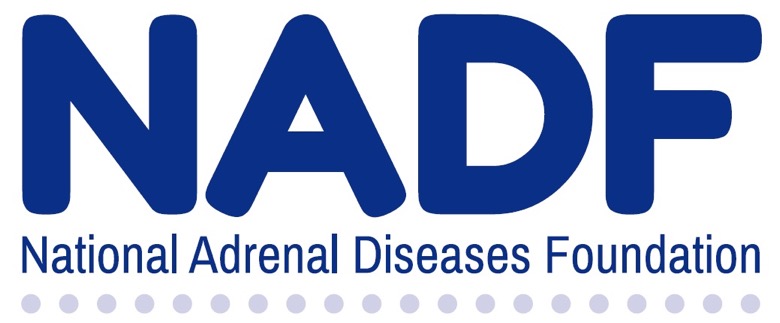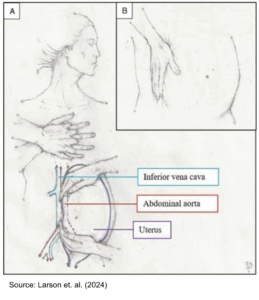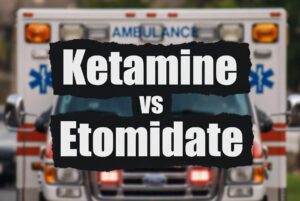Author: Joshua Stilley, MD FACEP FAEMS
This article was written in collaboration with the National Adrenal Diseases Foundation
Background:
Adrenal crisis occurs when the adrenal glands are unable to produce enough endogenous steroids under stress. This is often due to primary adrenal insufficiency, also known as Addison’s disease, or secondary causes like chronic exogenous steroid use leading to adrenal suppression. The downstream effect is an inability to respond to stress, which can lead to shock, often resistant to fluids and vasopressors. The primary treatment for adrenal crisis is the administration of steroids. Many patients with adrenal insufficiency are prescribed steroids and are instructed to take them at the first signs of illness, as the disease can rapidly progress to profound shock.
However, a recent survey revealed that many patients with adrenal insufficiency are hesitant to give themselves their injections, and many Emergency Medicine and EMS Clinicians are unaware of the appropriate treatment for this condition.
Case 1:
A patient with a history of Addison’s disease lacked rescue steroids at home. After contracting norovirus with the usual GI symptoms, she experienced rapid progression to adrenal crisis. The responding BLS crew was unable to initiate adequate resuscitation, despite signs of shock. In the emergency department, a lack of awareness about Addison’s disease led to delayed steroid administration. The patient eventually recovered, but the emotional toll was significant. She later reflected, “I have never received worse care in my life. I realized that even wearing a MedicAlert bracelet is no guarantee that I will receive the care I need.”
Case 2:
An adult female with Addison’s disease was involved in a motor vehicle crash, experiencing chest pain after a frontal impact. She had oral hydrocortisone available and handed EMS a sheet explaining her condition. The secondary paramedic stated “My mom has this, she needs to take that medicine”, preventing a full-blown crisis. In the emergency department, the patient was evaluated and safely discharged.
These cases highlight the impact of adrenal insufficiency on patients, especially during encounters with emergency care systems. Patients with adrenal insufficiency often expect clinicians to understand the management of their condition, even though it’s not a core competency for EMS. Lack of awareness can lead to emotional and physical harm, while appropriate care can avert crises.
Primary Adrenal Insufficiency (Addison’s Disease)
Primary adrenal insufficiency, or Addison’s disease, is a rare disorder in which the adrenal glands are partially or completely destroyed. As a result, patients cannot produce cortisol, the body’s primary stress hormone. These patients take exogenous steroids daily to compensate. During periods of physical or emotional stress, the body demands more cortisol, but because these patients cannot produce it naturally, they require additional doses of steroids. Failure to provide these additional doses can lead to an adrenal crisis, characterized by severe hypotension, altered mental status, cognitive impairment, nausea with vomiting, extreme fatigue, and pain.
Secondary Adrenal Insufficiency
Secondary adrenal insufficiency is more common than Addison’s disease and occurs in patients who have been on exogenous steroids for more than five days or so. These patients can be on steroids due to a need for immunosuppression such as from an organ transplant, have chronic inflammatory conditions such as lupus, or be on a prolonged course of steroids following acute illness, such as a COPD exacerbation. The prolonged use of steroids suppresses the body’s natural cortisol production. When stress occurs, the adrenal glands are unable to meet the body’s increased need for cortisol, leading to a presentation similar to primary adrenal insufficiency.
EMS Treatment of Adrenal Crisis
Fortunately, treating adrenal insufficiency in the field aligns closely with standard care. Steroids such as methylprednisolone (Solu-Medrol) and dexamethasone (Decadron) are commonly available in ALS ambulances and are appropriate for preventing or treating adrenal crisis. In the emergency department, hydrocortisone (2 mg/kg up to 100 mg IV) is the preferred steroid, as it provides both glucocorticoid and mineralocorticoid effects. Methylprednisolone and dexamethasone are not quite as effective, but are still significantly better than no steroid treatment.
Patients in adrenal crisis often present similarly to those with septic shock, requiring fluid resuscitation and vasopressors. However, without steroids, these patients may not respond to standard treatments. Even if steroid administration doesn’t immediately resolve the shock, it is not contraindicated and remains the standard of care. This author had a personal encounter with a patient who medical control had ordered EMS not to provide fluids and pressors, stating it was contraindicated. Just because something may not be effective, does not mean that it is contraindicated. It is still most appropriate, and the expected standard of care, to resuscitate patients in shock.
Patient Self-Administration of Steroids
Many patients with adrenal insufficiency carry steroids for crisis administration, including oral or intramuscular (IM) hydrocortisone (Solu-Cortef). However, some patients lack familiarity with self-administering injectable medications. In many regions, EMS providers are allowed to assist patients in administering their own medications or, if trained, may administer IM injections directly. When in doubt, consult medical control, particularly if the patient has Addison’s disease or adrenal insufficiency and is requesting steroid administration.
Key Considerations for EMS
Recognition of adrenal insufficiency can be challenging, but there are cues to look for. A MedicAlert bracelet, the presence of steroids at the scene, or the patient mentioning “Addison’s disease” or “adrenal insufficiency” should raise suspicion for adrenal crisis. Proper treatment, including steroid administration, can be life-saving, and prompt intervention demonstrates professionalism, compassion, and clinical competence. Adrenal insufficiency is one more condition EMS providers should be prepared to encounter and manage effectively.
References
Dineen, R., Thompson, C. J., & Sherlock, M. (2019). Adrenal crisis: Prevention and management in adult patients. Therapeutic Advances in Endocrinology and Metabolism, 10, 2042018819848218. https://doi.org/10.1177/2042018819848218
Lentz, S., Collier, K. C., Willis, G., & Long, B. (2022). Diagnosis and Management of Adrenal Insufficiency and Adrenal Crisis in the Emergency Department. The Journal of Emergency Medicine, 63(2), 212–220. https://doi.org/10.1016/j.jemermed.2022.06.005
Puar, T. H. K., Stikkelbroeck, N. M. M. L., Smans, L. C. C. J., Zelissen, P. M. J., & Hermus, Ad. R. M. M. (2016). Adrenal Crisis: Still a Deadly Event in the 21st Century. The American Journal of Medicine, 129(3), 339.e1-339.e9. https://doi.org/10.1016/j.amjmed.2015.08.021




